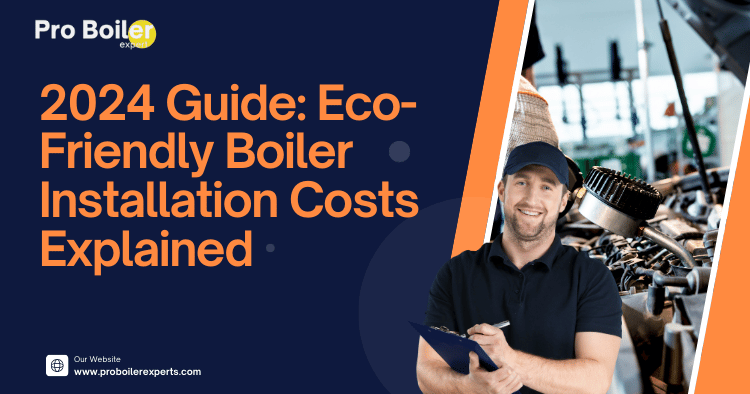Table of Contents
- Introduction
- What Are Eco-Friendly Boilers?
- Types of Eco-Friendly Boilers
- Factors Influencing the Cost of Eco-Friendly Boilers
- Average Costs of Eco-Friendly Boiler Installation
- Long-Term Savings and Benefits
- FAQs
- Conclusion
Introduction
In a world increasingly focused on sustainability, eco-friendly boilers are gaining traction as an excellent alternative to traditional heating systems. If you’re considering making the switch, understanding the installation costs is crucial. This guide delves into the various aspects of eco-friendly boiler installation costs to help you make an informed decision.
What Are Eco-Friendly Boilers?
Eco-friendly boilers are designed to minimize environmental impact while efficiently heating your home. They typically use renewable energy sources, such as biomass, solar power, or heat pumps, to reduce carbon emissions. In contrast to conventional boilers that rely on fossil fuels, eco-friendly options optimize energy use and promote sustainability.
Benefits of Eco-Friendly Boilers:
- Lower Carbon Footprint: Significantly reduces greenhouse gas emissions.
- Energy Efficiency: Many eco-friendly boilers boast high energy efficiency ratings, translating to lower energy bills.
- Renewable Energy Incentives: Homeowners may qualify for government incentives or rebates for installing eco-friendly systems.
Types of Eco-Friendly Boilers
When it comes to eco-friendly boilers, several types are available, each with unique features and benefits. Here are the most common options:
| Type | Description | Pros | Cons |
|---|---|---|---|
| Biomass Boilers | Uses organic materials like wood pellets or chips. | Renewable fuel source, lower emissions. | Requires storage space for fuel. |
| Solar Thermal Boilers | Utilizes solar panels to heat water. | Low operational costs, renewable energy. | High initial installation cost. |
| Heat Pumps | Transfers heat from the air or ground into your home. | Highly efficient, versatile for cooling. | Performance can drop in extreme weather. |
| Condensing Boilers | Captures and reuses heat from exhaust gases. | High efficiency, lower emissions. | More complex installation and maintenance. |
Also look for the top benefits of biomass boilers to see how they can enhance your home heating system.
Factors Influencing the Cost of Eco-Friendly Boilers
Several factors affect the installation costs of eco-friendly boilers. Understanding these can help you budget more effectively:
- Type of Boiler: The upfront cost varies significantly between different types of eco-friendly boilers.
- Installation Complexity: More complex systems may require additional labor and materials, increasing costs.
- Size of the Home: Larger homes generally need larger units or multiple systems, adding to the overall cost.
- Location: Installation costs can vary based on your geographical area and local labor rates.
- Incentives and Rebates: Government programs may offset costs, so it’s worth researching available financial assistance.
For further insights, check out our article on financing options for boiler installation costs.
Average Costs of Eco-Friendly Boiler Installation
The costs for eco-friendly boiler installation can vary widely based on the factors discussed above. Below is an estimate of what you might expect:
| Type of Boiler | Average Installation Cost (USD) |
|---|---|
| Biomass Boiler | $6,000 – $15,000 |
| Solar Thermal Boiler | $5,000 – $10,000 |
| Heat Pump | $7,000 – $15,000 |
| Condensing Boiler | $3,500 – $7,500 |
Keep in mind that these are average costs and can fluctuate based on specific circumstances. Additionally, always get multiple quotes from contractors to ensure you receive a fair price.
To understand how these costs break down by type, refer to our detailed guide on boiler installation costs by type.
Long-Term Savings and Benefits
While the upfront costs of eco-friendly boilers are often higher than conventional options, the long-term benefits can make them a worthwhile investment.
Energy Savings
Eco-friendly boilers typically offer significant energy savings, leading to reduced utility bills. For instance, a biomass boiler can cut heating costs by up to 30% compared to traditional oil or gas systems.
Environmental Impact
Switching to an eco-friendly boiler helps reduce your carbon footprint, contributing to a healthier planet. The use of renewable energy sources also promotes energy independence.
Increased Home Value
Sustainable features can enhance your home’s marketability and value. Potential buyers are increasingly looking for energy-efficient homes, making eco-friendly heating systems an attractive feature.
For more on the efficiency of various types of boilers, see our article on high-efficiency boilers.
FAQs
Q: Are eco-friendly boilers more expensive to maintain?
A: Generally, eco-friendly boilers can have slightly higher maintenance costs due to their complex systems, but they often require less frequent repairs than traditional boilers.
Q: Do I need a special permit for installation?
A: Permits may be required depending on local regulations and the type of boiler you choose. It’s best to check with local authorities or your installation contractor.
Q: Can I switch from a traditional boiler to an eco-friendly one easily?
A: Yes, although the ease of installation may vary based on your home’s existing infrastructure. Consulting with a professional can help determine the best approach.
For a comprehensive look at the installation process, visit our guide on what to expect on installation day.
Conclusion
Investing in an eco-friendly boiler is not just about immediate costs; it’s also about long-term savings, environmental benefits, and enhancing your home’s value. As you navigate through your options in 2024, consider the various factors that influence costs and choose a system that aligns with your sustainability goals. For more information on eco-friendly heating solutions, check out resources from the Department of Energy or the Energy Saving Trust.
Switching to an eco-friendly boiler is a significant step toward a greener future, and understanding the costs involved can help you make the best choice for your home and the environment.





